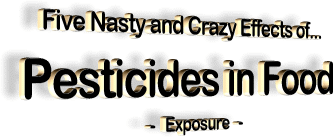1 - Effects of Pesticides - Cancer
The dreaded diagnosis of cancer has
been linked in over 260 studies worldwide to agrochemicals.
Worse, scientists have linked pesticides with several types of
cancers, including that of the breast, prostate, brain, bone,
thyroid, colon, liver, lung, and more.
Some researchers from USC
found that,
ďthose who lived within 500 meters of places
where methyl bromide, captan and eight other organochlorine
pesticides had been applied, they found, were more likely to
have developed prostate cancer.Ē
But even indirect exposure, such as
through parental use, has been found to affect children in a
terrible way. A study published in Environmental Health
Perspectives has linked parental use of pesticides with an
increased risk of brain cancer in children.
ďParental
exposures may act before the childís conception, during
gestation, or after birth to increase the risk of cancer,Ē the
study said.
And when the parents are exposed to the pesticides
may also play a role in the different cellular changes that lead
to cancer.
2 - Obesity and Diabetes
Because pesticides have also
been
linked to obesity, itís logical that it would be connected
to diabetes, in which obesity often has a role.
Some researchers
found a higher prevalence of obesity in the participants with
high urinary concentrations of a pesticide known
as 2,5-dichlorophenol (2,5-DCP). It is important to note that
2,5-DCP is one of the most widely used pesticides on the globe.
Robert Sargis, MD, PhD, revealed his
recent study findings at the Endocrine Societyís 94th
Annual Meeting, stating that agricultural fungicide created
insulin resistance in fat cells.
The journal Diabetes Carepublished
in 2011 that people with excess weight and high levels of
organochlorine pesticides in their bodies had greater risk of
becoming diabetic.
3 - Parkinsonís Disease
Long-term exposure to herbicides and
pesticides have been associated in over 60 studies with
Parkinsonís. You donít have to be a conventional farmer to be
wary of these findings.
Use natural methods to keep pests and
weeds out of your home and garden today.
4 - Infertility and Birth Defects
One of the most well-known negative
effects of pesticides, infertility is continuously found to be a
result of exposure to these agrochemicals.
Atrazine - a weed
killer used in agriculture as well as on golf courses and which
has been found in tap water - may be partially responsible for
climbing miscarriage and infertility rates. As for men, one 2006
study pinpointed chlorpyrifos with lowering testosterone levels.
This pesticide is often found in strawberry fields and apple and
peach orchards.
Other researchers tested roundup on
mature male rats at a concentration range between 1 and 10,000
parts per million (ppm),
and found that within 1 to 48 hours of exposure, testicular
cells of the mature rats were either damaged or killed.
Avoid pesticides even if youíre
already pregnant. These chemicals are responsible for
causing various birth defects, too. A report revealed that
the top selling herbicide Roundup disrupts male hormones due to
the main active ingredient -
glyphosate.
5 - Autism
Admittedly, pesticides arenít solely
to blame for autism, but they may be a hefty part of the
equation.
Leading scientists are attributing the condition to
genes and insecticides exposed to the mother while pregnant as
well as to the child in early years. This is because many
chemicals affect the neurology of bugs, inadvertently affecting
the neurological function of children, too.
A 2010
Harvard study blames organophosphate pesticides - found in
childrenís urine - to ADHD.
What is the best way to to avoid
pesticide exposure and
pesticides in food? Donít use pesticides, and buy organic.
Organic isnít always easy or cheap, so keep in mind these
updated
dirty dozen fruits and vegetables to always buy organic
(plus 15 cleaner foods you can afford to buy conventional).
NASA
has also suggested raising
air purifying plants indoors to clear your home of indoor
air pollution.
Remember to remove pesticides from your home,
too.

